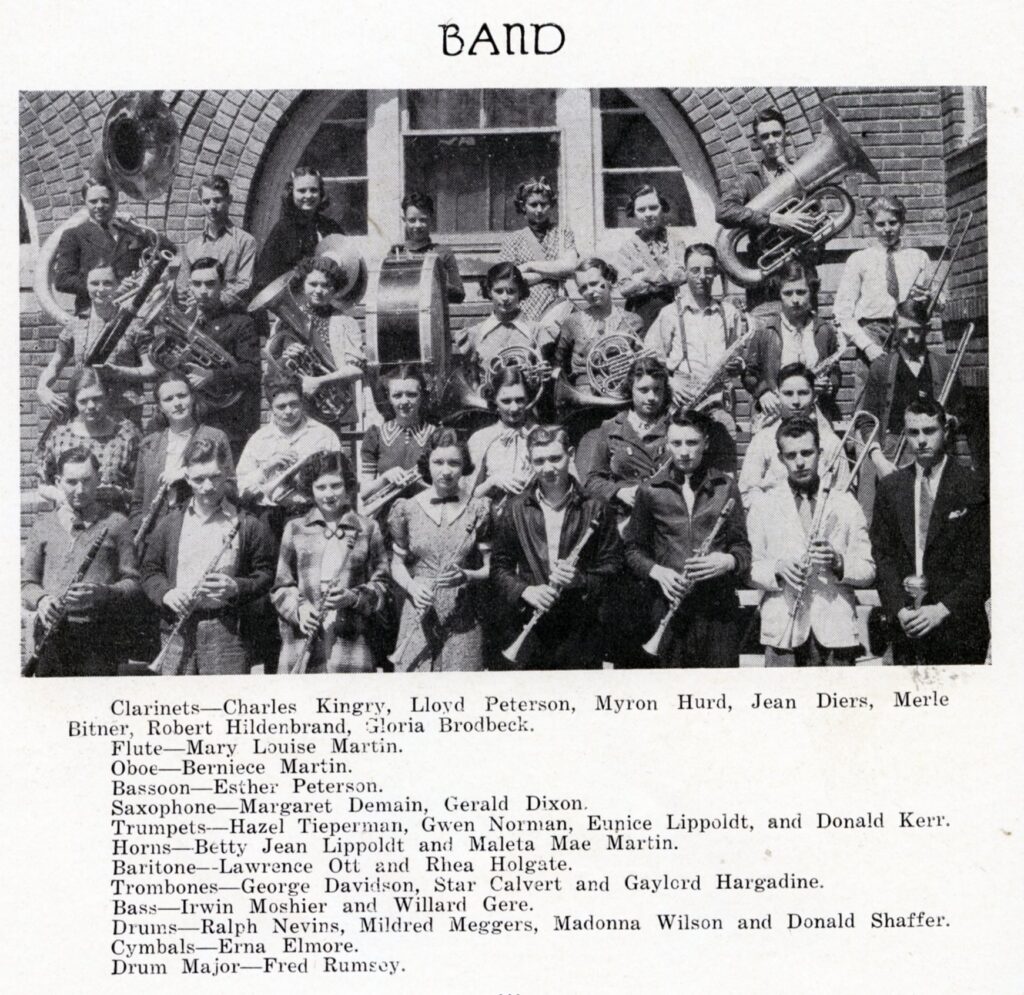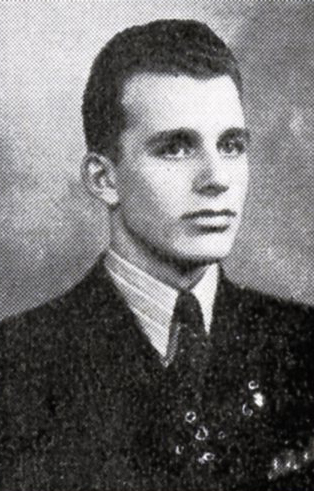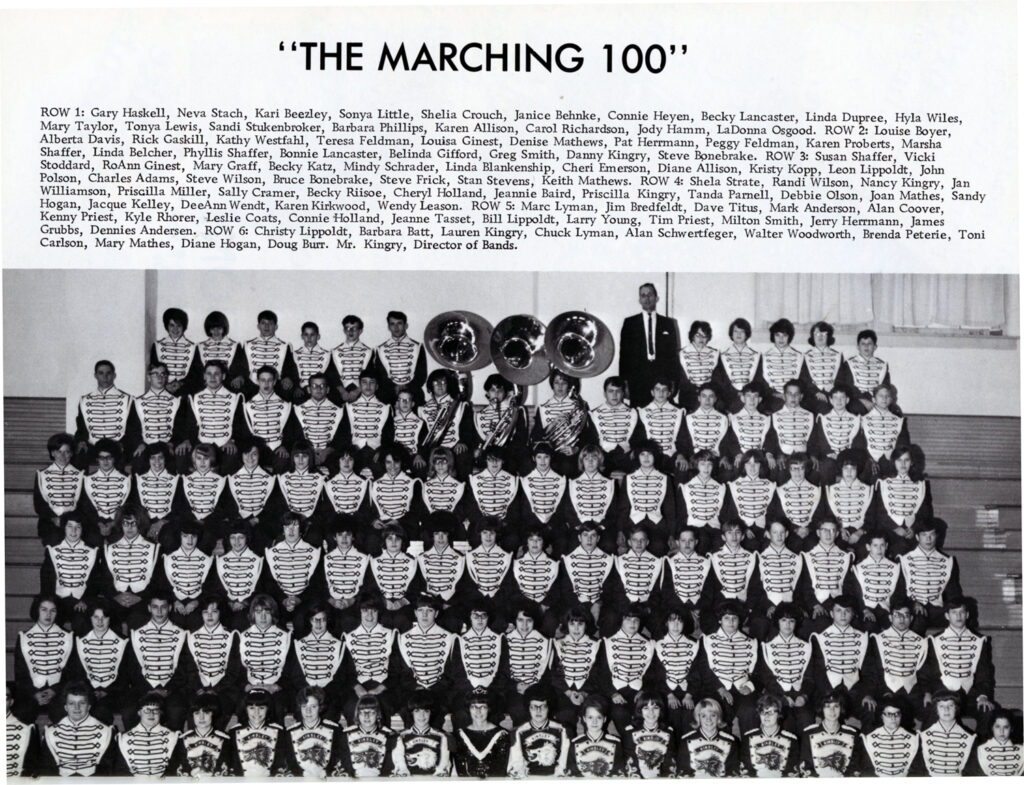Last week I introduced you to Lester Beck who fostered a love of music in Kinsley boys from 1912-1919. This week we will fast forward fifty years and remember Charles Kingry who ushered in the glory days of the Kinsley High School Band from 1961-1972.
Charles was born in Hodgeman County on October 24, 1918 to Albert and Bessie Kingry. He grew up in Kinsley, and it was only natural that he would become a musician as his mother was a piano teacher and played for services at the Kinsley Christian Church.
Charles began playing the piano at a very early age and later played clarinet and saxophone in the Kinsley High School Band. He was well known for his beautiful tenor voice.


He graduated from KHS in 1937 and received a scholarship to study voice at Bethany College. That was where he would receive his degree and also meet Martha Nell Pinney, another music major, who would become his wife. They were married in 1941 and Charles began teaching at Walton, KS. Soon he was drafted into the army and served in North Africa during World War II where he also sang in quartets to lift the spirits of his fellow soldiers.
After the war, the Kingrys would have five children (Danny, Lauren, JoNell, Lynda and Thyra). Charles would teach music in several area schools including Utica (1945), Tribune (1949), Haviland and St. Nicolaus School in Kinsley (1953) and Rozel before becoming the KHS instrumental music instructor in the fall of 1962. That year, the 67 band members got new uniforms and began gaining a reputation. Besides marching at the home football games, Charles had them travel to play at the State Fair in Hutchinson and for the Fort Hays State College homecoming.
During the sixties, Kinsley High School enrollment was about 250 students and the Junior High was 100. In 1963, when the band became “The Marching 100”, a large percentage of this small school system was in the band.
On October 5, 1961. under Charles’ direction, the KHS drum corps developed a new precision cadence which brought them the honor of leading all the bands onto the field at the Kansas Wesleyan Band Day in Salina.
In 1964, the band joined over 100 other bands to parade for the Colorado University’s Band Day in Boulder where they witnessed K-State beat CU, 16 to 14. The band also played in Hutchinson for the state fair and participated at Fort Hays State College homecoming. Of the twenty-seven bands in attendance at the latter, the Marching 100 was the largest with 110 members, and it received a Superior Rating for its sound quality, marching ability and appearance.
In 1965 the band returned to Colorado University as one of a hundred participating bands. The three judges gave the band “highly superior” ratings and a recommendation to apply to appear in the Cotton Bowl parade.
Charles went to work sending the Cotton Bowl committee a tape of the concert band and gathering letters of recommendation from other band directors. In the spring of 1965, the letter came that is the thrill and dream of every high school band. The Marching 100 were invited to be one of twenty bands to play in the Cotton Bowl Parade in Dallas on New Year’s Ever, 1966.
The band had to raise $3000 for the trip and through the support of the school, civic groups, and the hard work of students in a “WOW – Work Our Way” campaign they did just that.
Drum Majorette, Hyla Wiles, kept a journal of the trip. “Saturday morning came and we were called out of bed at 6:30 a.m. The weather was disappointing because it was foggy and cold. However, this did not keep the Marching 100 from rousing their enthusiasm. As soon as we reached the fairgrounds, we lined up behind the high school band from Irving, Texas. While we stood in place, we played and marked time. Finally, it was time to move out. We marched behind the Dallas County Sherriff’s Posse. The TV cameras were over halfway in the parade. The band looked great and the many floats were beautiful.” (Kinsley Mercury, January 5, 1966)
During the following years, the Marching 100 would continue to play at K-State Band Days, the state fair, Fort Hays State College homecomings and in 1971 for the Lindborg Festival.
Although the Marching 100 received most of the glory, during his tenure, Charles Kingry also directed a large pep band, a stage band and a concert band. All received honors and his impact on KHS students cannot be estimated.
Charles decided to slow down and spent the last two years teaching in the Kinsley grade school and junior high school where he produced operettas. In 1975, he retired, and in 1982 he was inducted into the Kansas Teachers Hall of Fame.
Throughout the years Martha Nell accompanied Charles as he sang in church, at funerals, and on other occasions. He also was a natural whistler and enjoyed playing the harmonica and spoons. After sixty-four years of marriage, Martha Nell died in 2005. Charles died in 2014, and they are buried at Hillside Cemetery.

